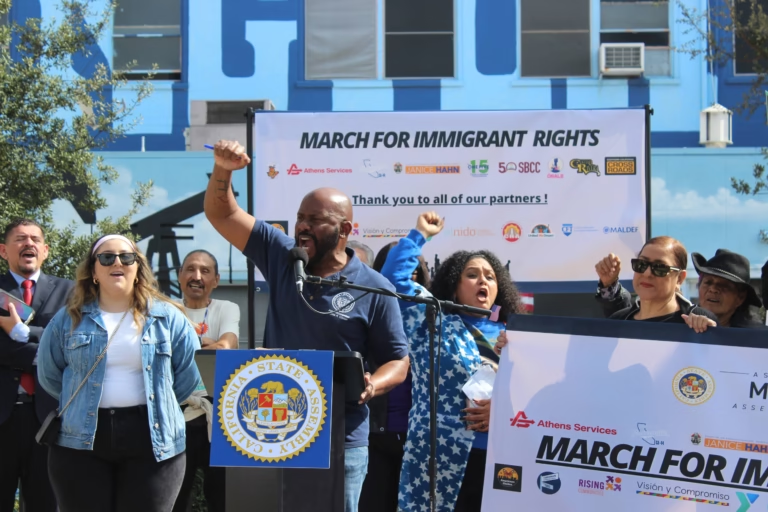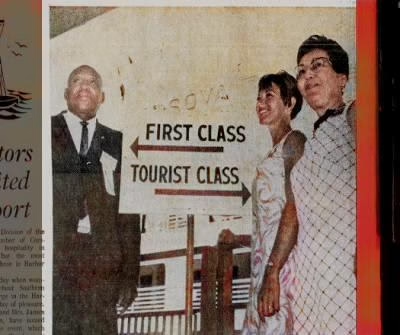By Daniel Rivera, Reporter
On the morning of Feb. 22, elected officials and community members rallied at the Wilmington Municipal Building in solidarity with immigrant communities and to provide various resources to local families.
“We stand in solidarity with you and you’re not going back… let me say this… it is important that you know your rights… It is important that you educate yourself to make sure that the best weapon against deportation is knowing your rights,” Assemblyman Mike Gipson said in a speech towards the end of the rally.
His and Councilman McOsker’s office provided a variety of material directing them on where to get help, the various departments, and its local partner organizations like Organizing Rooted in Abolition, and Empowerment or ORALE.
They are rallying against the Trump administration’s policies on deportations through the Immigration and Customs Enforcement which has ramped up operations in various Californian communities directed at multiple community centers like workplaces or places of worship placing pressure on immigrant communities as they lose access to work and life resources.
Border Czar, Tom Homan during previous statements had originally indicated they would prioritize people with prior criminal histories but had recently shifted to all people who are in the country illegally are “on the table.”
According to data gathered by NBC, about 1,800 people or about 41% of the people arrested so far have had no prior criminal history and the administration has labeled these “collateral arrests.” According to data provided by US Customs and Borders Protection, the vast majority of those with criminal records are non-violent crimes of drug possession or driving under the influence.
The administration blames the Sanctuary City law, barring Californian law enforcement agencies from sharing information with ICE or cooperating with them on deportation operations.
“My parents taught me, that unless you were here when the the settlers came, original people, or unless you came in chains, we are all immigrants,” said Los Angeles Councilmember Tim McOsker in a speech.
Community organizations across Los Angeles County have pushed back against Trump’s immigration policies by forming a rapid response network to monitor ICE activity, film ICE interactions with the detained, and provide legal aid and information to immigrants arrested by ICE.
Recently, Trump has demoted acting ICE director Caleb Vitello, a 20-year veteran of ICE reportedly due to Trump’s frustration with slow arrests and deportations. The agency has not been reaching its targets due to alleged shortfalls in funding, which limit both their reach and capacity prompting possible diversion of funds from other departments like the Coast Guard and Transporation Security Administration.
“They are forcing people to give up their green card at the border, by voluntarily relinquishing it by signing a form called the I-407,” said Alfonso Morales an immigration lawyer during the rally. Immigrants who are pressed into signing the form will relinquish their permanent residency status.
According to Morales, border agents will coerce legal permanent residents who have a criminal history and have the right to a trial to determine whether they should be allowed to stay. The form itself is voluntary and residents have access to what’s called “cancellation” in which a resident can be forgiven one time provided they have been inside the United States for seven years and remain a resident for about five years.
Near the end of the rally, local organizations like ORALE direct community members to legal aid and information on deportations and Rising Communities who are providing information and referrals to various medical resources.





 Flood was a man of deep Christian convictions and a lifelong advocate for workers’ rights, racial equality, and community development. Born on June 6, 1897, in Kansas City, Missouri, Flood was the son of a preacher. Despite his religious upbringing, he chose to serve in the U.S. Navy during World War I, enlisting in Colorado. In the early 1930s, he moved to Shreveport, Louisiana, where he joined the Veterans of Foreign Wars (VFW) and worked at a meat processing plant. By 1943, he relocated to San Pedro, California, finding employment as an electrician at Todd Shipyards and beginning a decades-long career in labor and community activism.
Flood was a man of deep Christian convictions and a lifelong advocate for workers’ rights, racial equality, and community development. Born on June 6, 1897, in Kansas City, Missouri, Flood was the son of a preacher. Despite his religious upbringing, he chose to serve in the U.S. Navy during World War I, enlisting in Colorado. In the early 1930s, he moved to Shreveport, Louisiana, where he joined the Veterans of Foreign Wars (VFW) and worked at a meat processing plant. By 1943, he relocated to San Pedro, California, finding employment as an electrician at Todd Shipyards and beginning a decades-long career in labor and community activism.







